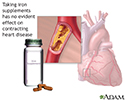Taking iron supplements
Eating iron-rich foods is a key part of treating anemia caused by low iron levels. You may also need to take iron supplements as well to rebuild iron stores in your body.
Information
ABOUT IRON SUPPLEMENTS
Iron supplements may be taken as capsules, tablets, chewable tablets, and liquids. The most common tablet size is 325 mg (ferrous sulfate).
Have your health care provider tell you how many pills you should take each day and when you should take them. Taking more iron than your body needs can cause serious medical problems.
Blood counts return to normal after 2 months of iron therapy for most people. You should continue taking supplements for another 6 to 12 months to build up the body's iron stores in the bone marrow.
TIPS FOR TAKING IRON
Iron is absorbed the best on an empty stomach. Yet, iron supplements can cause stomach cramps, nausea, and diarrhea in some people. You may need to take iron with a small amount of food to avoid this problem.
Milk, calcium and antacids should NOT be taken at the same time as iron supplements. You should wait at least 2 hours after having these foods before taking your iron supplements.
Foods that you should NOT eat at the same time as you take your iron include:
- High fiber foods, such as whole grains, raw vegetables, and bran
- Foods or drinks with caffeine
Some doctors suggest taking a vitamin C supplement or drinking orange juice with your iron pill. This can help the iron absorb into your body. Drinking 8 ounces (240 milliliters) of fluid with an iron pill is also OK.
Tell your provider about all the medicines you are taking.
- Iron tablets may cause other drugs you are taking to not work as well. Some of these include tetracycline, penicillin, and ciprofloxacin and drugs used for Parkinson disease and seizures.
- Wait at least 2 hours between doses of these drugs and iron supplements.
SIDE EFFECTS
Constipation and diarrhea are very common. If constipation becomes a problem, take a stool softener such as docusate sodium (Colace).
Nausea and vomiting may occur with higher doses, but they can be controlled by taking the iron in smaller amounts. Ask your provider about switching to another form of iron rather than just stopping.
Black stools are normal when taking iron tablets. In fact, this is felt to be a sign that the tablets are working correctly. Talk to your provider right away if:
- The stools are tarry-looking as well as black
- If they have red streaks
- Cramps, sharp pains, or soreness in the stomach occur
Liquid forms of iron may stain your teeth.
- Try mixing the iron with water or other liquids (such as fruit juice or tomato juice) and drinking the medicine with a straw.
- Iron stains can be removed by brushing your teeth with baking soda or peroxide.
Keep tablets in a cool place. (Bathroom medicine cabinets may be too warm and humid, which may cause the pills to fall apart.)
Keep iron supplements out of the reach of children. If your child swallows an iron pill, contact a poison control center right away.
References
Brenner GM, Stevens CW. Hematopoietic drugs. In: Brenner GM, Stevens CW, eds. Pharmacology . 4th ed. Philadelphia, PA: Elsevier Saunders; 2013:chap 17.
Ginder GD. Microcytic and hypochromic anemias. In: Goldman L, Schafer AI, eds. Goldman-Cecil Medicine . 25th ed. Philadelphia, PA: Elsevier Saunders; 2016:chap 159.
-
Iron supplements - illustration
The mineral iron is an essential nutrient for humans because it is part of blood cells, which carry oxygen to all body cells. There is no conclusive evidence that iron supplements contribute to heart attacks.
Iron supplements
illustration
Review Date: 5/3/2015
Reviewed By: Laura J. Martin, MD, MPH, ABIM Board Certified in Internal Medicine and Hospice and Palliative Medicine, Atlanta, GA. Also reviewed by David Zieve, MD, MHA, Isla Ogilvie, PhD, and the A.D.A.M. Editorial team.

